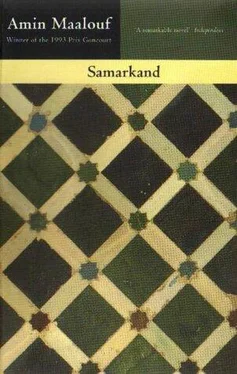Through a window to his left the qadi expertly calculated the sun’s passage. He stood up.
‘It is time to go and meet our sovereign,’ he said.
He clapped his hands.
‘Bring us some fortification for the journey.’
It was his practice to supply himself with raisins to munch on his way, a practice much imitated by those around him and those who came to visit him. Hence the immense copper platter which was brought in to him piled high with a mound of these pale treats for everyone to stuff their pockets.
When it was Scar-Face’s turn, he grabbed a small handful which he held out to Khayyam with the words, ‘I suppose that you would prefer me to offer these to you as wine.’
He did not speak in a very loud voice, but as if by magic everyone present fell silent. They stood with bated breath, watching Omar lips. He spoke.
‘When one wishes to drink wine, one chooses carefully one’s cupbearer and drinking companion.’
Scar-Face’s voice rose a little.
‘For my part, I would not touch a drop. I am hoping for a place in paradise. You do not seem anxious to join me there.’
‘The whole of eternity in the company of sententious ulema? No, thank you. God promised us something else.’
The exchange stopped there. Omar hurried to join the qadi who was calling him.
‘The townspeople must see you ride next to me. That will dispel their impressions of yesterday evening.’
In the crowd gathered around the residence, Omar thought he could make out the almond-seller concealed in the shadow of a pear-tree. He slowed down and looked around for her, but Abu Taher badgered him.
‘Faster. Woe betide you should the Khan arrive before us.’
‘Since the dawn of time astrologers have proclaimed that four cities were born under the sign of revolt, Samarkand, Mecca, Damascus and Palermo, and their words are truth! These cities have only ever submitted to government through force. They follow the straight path only when it is traced by the sword. The Prophet reduced the arrogance of the Meccans by the sword and it is by the sword that I will reduce the arrogance of the people of Samarkand!’
Nasr Khan, the master of Transoxania, a bronzed giant in flowing embroidered robes, gesticulated standing in front of his throne. His voice caused trembling amongst his household and visitors. His eyes sought out amongst those present a victim, a lip that might dare to tremble, an insufficiently contrite look, the memory of some treachery. By instinct everyone slipped behind his neighbour, letting his back, neck and shoulders slump, and waited for the storm to pass.
Having found no prey for his claws, Nasr Khan grabbed armfuls of his ceremonial robes and in a fury flung them one after another into a pile at his feet, yelling insult after insult in the sonorous Turco-Mongol dialect of Kashgar. According to custom, sovereigns would wear three, four or sometimes seven layers of embroidered robes, which they peeled off during the day, solemnly placing them on the backs of those whom they wish to honour. Behaving in such a manner, Nasr Khan showed that day that he had no intention of gratifying any of his numerous visitors.
As with every sovereign’s visit to Samarkand, this was to have been a day of festivities, but any trace of joy was extinguished in the first minutes. Having climbed the paved road leading up from the River Siab, the Khan effected his solemn entry by the Bukhara Gate at the north of the city. He smiled with his whole face, making his small eyes seem more deeply set, more slanting than ever, and making his cheekbones glow in the amber reflection of the sun. Then suddenly he lost his good humour. He approached a group of some two hundred notables who were gathered around the qadi Abu Taher, focusing a worried and almost suspicious gaze upon the group in whose midst was Omar Khayyam. Apparently not having seen those he sought, he abruptly made his horse rear up, jerked hard on the reins and moved off, grumbling inaudibly. Rigid on his black mare, he no longer smiled, nor did he respond with the slightest gesture to the repeated cheers of the thousands of citizens who had been gathering there since dawn to greet him. Some of them held up petitions, composed by some public scribe. In vain, for no one dared to present his petition to the sovereign, but rather applied to the chamberlain who leaned over again and again to accept the sheets, mouthing a vague promise to take action.
Preceded by four horsemen, holding aloft the brown standards of the dynasty, followed on foot by a slave naked to the waist and bearing a huge parasol, the Khan crossed the great thoroughfares lined with twisting mulberry trees without stopping. He avoided the bazaars and went along the main irrigation canals, called ariks , until he came to the district of Asfizar. There he had had set up a temporary palace, directly adjoining Abu Taher’s residence. In the past, sovereigns would lodge inside the citadel, but since recent battles had left it in a state of extreme dilapidation, it had had to be abandoned. Now, only the Turkish garrison would periodically erect its yurts there.
Having observed the sovereign’s bad humour, Omar hesitated to go to the palace to give his respects, but the qadi urged him, no doubt in the hope that the presence of his eminent friend would provide a favourable distraction. On the way, Abu Taher took it upon himself to brief Khayyam on what had just transpired. The religious dignitaries of the city had decided to boycott the reception, accusing the Khan of having burnt down the Grand Mosque of Bukhara where armed opponents had entrenched themselves. ‘Between the sovereign and the religious establishment,’ explained the qadi , ‘the war rages on as ever. Sometimes it is overt and bloody, but most often clandestine and insidious.’
It was even rumoured that the ulema had made contact with a number of officers who were exasperated by the behaviour of the prince. His forbears used to eat with the troops, they said, omitting no occasion to state that their power derived from the bravery of their people’s warriors. But from one generation to the next, the Turkish khans had acquired the regrettable habits of the Persian monarchs. They thought of themselves as demi-gods, surrounding themselves with an increasingly complex ceremonial which was incomprehensible and humiliating for their officers. A number of the latter had thus consulted the religious chiefs. They took pleasure in hearing the officers vilify Nasr and accuse him of having cast aside the ways of Islam. To intimidate the military, the sovereign reacted harshly against the ulema . Had not his father, a pious man moreover, inaugurated his reign by cutting off an abundantly turbaned head?
In this year of 1072, Abu Taher was one of the few religious dignitaries who managed to maintain close ties with the prince, visiting him often in the citadel of Bukhara, his main residence and receiving him with solemnity each time he stopped at Samarkand. Certain of the ulema eyed warily Abu Taher’s conciliatory attitude, but most of them welcomed the presence of this intermediary.
Yet again the qadi easily fell into the role of conciliator. He avoided contradicting Nasr, profiting of the slightest glimmer of an improvement of his humour to buoy up his spirits. He waited until the difficult moments were over, and when the sovereign returned to his throne and Abu Taher had seen him finally settle himself firmly against a soft cushion, he undertook a subtle and imperceptible resumption of control which Omar watched with relief. Upon a sign from the qadi the chamberlain summoned a young slave-girl to pick up the robes which were abandoned on the ground like corpses after a battle. Instantly, the atmosphere became less stifling, people discreetly stretched their limbs and some chanced to whisper a few words into the nearest ear.
Читать дальше












